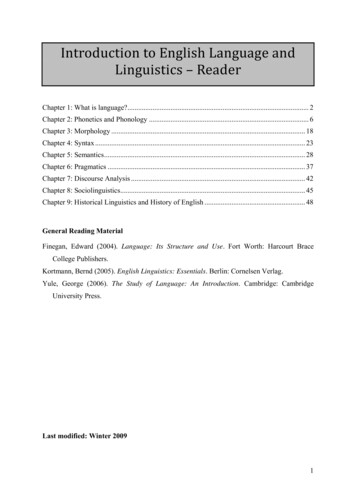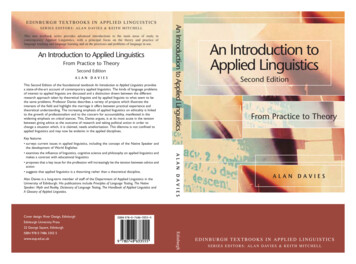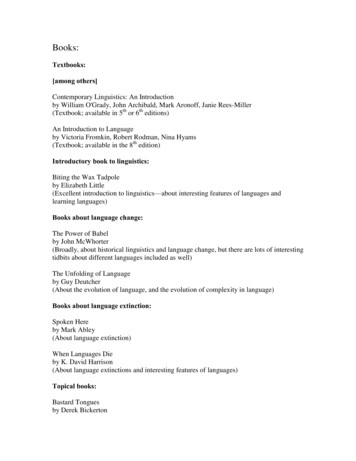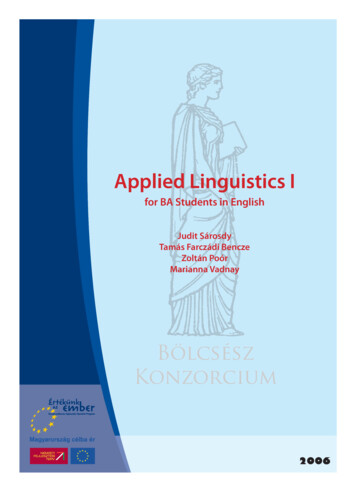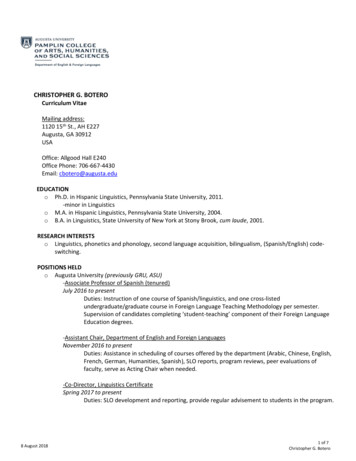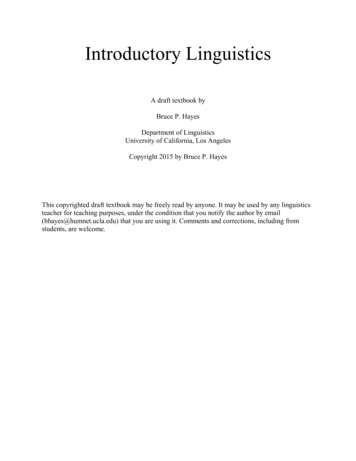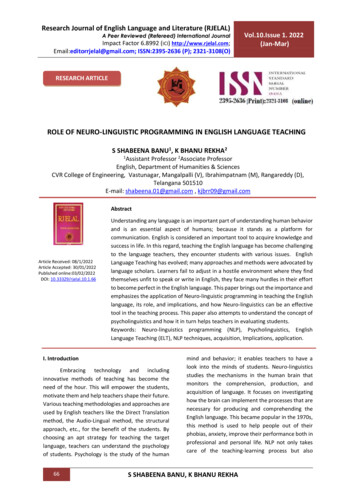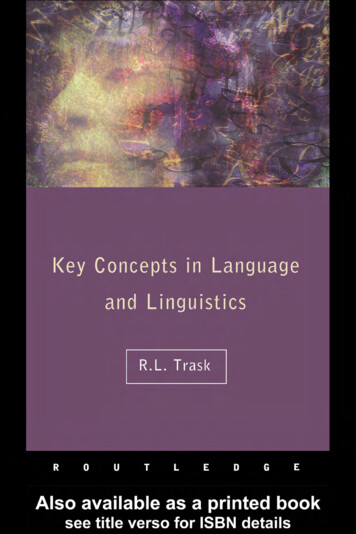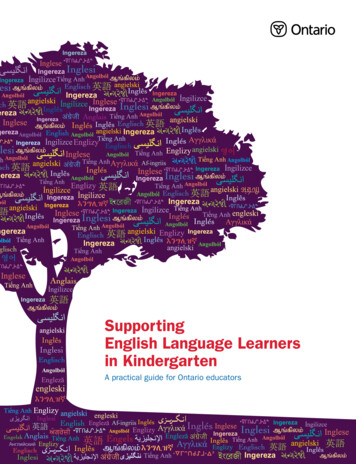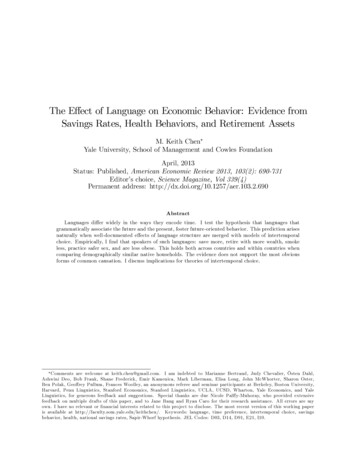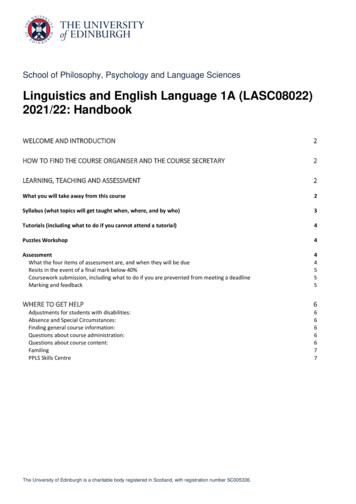
Transcription
School of Philosophy, Psychology and Language SciencesLinguistics and English Language 1A (LASC08022)2021/22: HandbookWELCOME AND INTRODUCTION2HOW TO FIND THE COURSE ORGANISER AND THE COURSE SECRETARY2LEARNING, TEACHING AND ASSESSMENT2What you will take away from this course2Syllabus (what topics will get taught when, where, and by who)3Tutorials (including what to do if you cannot attend a tutorial)4Puzzles Workshop4AssessmentWhat the four items of assessment are, and when they will be dueResits in the event of a final mark below 40%Coursework submission, including what to do if you are prevented from meeting a deadlineMarking and feedback44555WHERE TO GET HELP6Adjustments for students with disabilities:Absence and Special Circumstances:Finding general course information:Questions about course administration:Questions about course content:FamilingPPLS Skills CentreThe University of Edinburgh is a charitable body registered in Scotland, with registration number SC005336.6666677
Welcome and IntroductionWelcome to Linguistics and English Language 1A (‘LEL1A’ for short)! LEL1A is a self-contained, one semester,20 credit course taken in Semester 1. It offers a brief introduction to the study of language in general and ofEnglish in particular. The course considers language structure, language variation (including English and Scotsaccents and dialects), and what makes language special.How to find the Course Organiser and the Course SecretaryCourse Organiser: Professor Caroline Heycock Email: Caroline.Heycock@ed.ac.ukOffice hours: Email and ask for an appointment, suggesting some times that work for youCourse Secretary: Ms Susan Hermiston Email: lelinfo@ed.ac.ukLearning, teaching and assessmentWhat you will take away from this courseLEL1A has three broad aims: to introduce you to the scientific study of language in a coherent and systematic way; to introduce you to the fundamental terminology and analytic concepts involved in the study of thelinguistic structure of English and other languages; to encourage you to see language in its broader setting as a social, historical and biological phenomenon.On completion of this course, you will be able to:1. understand the difference between descriptive and prescriptive approaches to language and grammar2. understand the basic features of speech sounds, sound systems, word structure and sentencestructure3. understand the function of language as a vehicle for communication4. understand some of the special features of human language.The University of Edinburgh is a charitable body registered in Scotland, with registration number SC005336.2
Syllabus (what topics will get taught when, where, and by who)LEL1A concentrates on core topics of language structure in general and the structure of English in particular.The main blocks of content are: Language and CommunicationHistory and e Acquisition(Simon Kirby SK simon.kirby@ed.ac.uk)(Warren Maguire WM W.Maguire@ed.ac.uk)(Ben Molineaux BM Benjamin.Molineaux@ed.ac.uk)(Craig Sailor CS csailor@exseed.ed.ac.uk)(Craig Sailor CS csailor@exseed.ed.ac.uk)(Sumin Zhao SZ Sumin.zhao@ed.ac.uk)(Vicky Chondrogianni VC v.chondrogianni@ed.ac.uk)The course content will be delivered on a weekly basis. The typical pattern for each week will be three lectures (online; at 3.10pm on Monday, 10am on Tuesday, and 10am on Thursday)one tutorial (on campus; at various times and various locations);one workshop on the language puzzle / data problem of the week (online; at either 11.10am Thursdayor 2.10pm Friday; attendance encouraged but optional)The lectures will be delivered using the Teams platform; the workshops for the data problems will be on theGathertown platform. You will find information about how to access these online events within Learn. The lectureswill be recorded and the recordings made available; the workshops and tutorials will not be recorded.Timetable for classes (note that this timetable does not include the tutorials):WeekWeek beginsMon (3.10)Tues (10)Thurs (10)Thurs (11.10)Fri (2.10)120/09/2021Introduction(CH)Language &Communication(SK)Language 7/09/2021History &Variation (WM)History &Variation (WM)History &Variation ry &Variation (WM)History &Variation (WM)History &Variation tics (BM)Phonetics (BM)Phonetics tics (BM)Phonetics (BM)Phonetics x (CS)Syntax (CS)Syntax x (CS)Syntax e (SZ)Discourse (SZ)Discourse isition (VC)Acquisition (VC)Acquisition isition (VC)Acquisition (VC)Acquisition (VC)PuzzlesWorkshopPuzzlesWorkshopThe University of Edinburgh is a charitable body registered in Scotland, with registration number SC005336.3
Tutorials (including what to do if you cannot attend a tutorial)In addition to participating in the online lectures, you will also be assigned to a tutorial group (meeting one hourper week from Week 2). A tutorial group generally consists of around 12–15 students, and is led by a tutor whois a PhD student in LEL; your tutor is a good first point of contact if you have questions about the couse material.Tutorials are designed to reinforce what is covered in the course material, to give you practice in analysinglinguistic data and to prepare you for the assessments. You will be automatically allocated to a tutorial grouponce you are registered for the class, but should you need to change this—for instance, because the time isimpractical—please request this via Timetabling. A link to the online form can be found on the LEL1A LEARNpages under ‘Tutorial Information.’ There is no tutorial in Week 1.Attendance at tutorials is obligatory. If you cannot attend a tutorial for some reason (including, for example,if you have to self-isolate), please contact your tutor in advance to let them know, and explain why.Tutorial material will generally be based on the course content from the preceding week, and will be posted onLearn by the Monday of the week in which the tutorial will take place. Unless there are instructions to the contrary,you’ll be expected to work through the exercises before the tutorial meeting—either on your own or together withclassmates.Puzzles / Data problems WorkshopSeparately to the tutorial exercises, throughout the course you will be given linguistic puzzles to solve: intriguingsets of data to work through to discover the system that underlies them (you’ll find these referred to either as“puzzles” or as “data problems”). You can work on these on your own, or (even better) in pairs or larger groups.Each week there will be two opportunities to attend an online workshop where you can discuss that week’s puzzlewith your fellow students and also with two members of staff, Ben Molineaux (Benjamin.Molineaux@ed.ac.uk)and Linda Van Bergen (l.vanbergen@ed.ac.uk). Attendance at these workshops is not compulsory, and theseweekly puzzles are not assessed, but—as well as being fun in themselves—they will prepare you for oneassessed piece of work at the end of the semester (see below). There is much more information about thesepuzzles and the workshops on the Learn page.ReadingThere is no general reading list for the course. The lecturers for the different sections of the course will let youknow what reading they require and/or recommend for the material that they are teaching. Generally you’ll beable to find links to the readings that are referred to in the Resource List on the LEARN pages for the course. Ifyou have queries about what to read, usually the best person to ask is the lecturer who is teaching that part ofthe course.AssessmentWhat the four items of assessment are, and when they will be due A coursework assignment (worth 40%) answering one of a choice of questions. This is limited to amaximum of 1500 words (excluding titles and references). You will get more information about thenature of this assessment after the first few weeks of the course.Due date: Noon, Wednesday 17th November 2021 A reflective blog/journal entry (worth 20%) to be submitted towards the end of the course. Atdifferent points in the course we will give you prompts for blog/journal entries. After the first couple,there will be a chance to discuss your entries with classmates and exchange ideas about what makesfor an interesting / thought-provoking / informative entry. Then there will be further prompts in theremaining time, and you will be asked to choose one of these to submit for assessment.Due date: Noon, Wednesday 1 st December 2021 An assessed data problem (worth 20%) will be made available at the end of the course. The linguistic“puzzles that” you’ll have been working on throughout the semester, with the weekly workshopsrelating to them, will give you the relevant preparation for this assessed work.Due date: Noon, Monday 13th DecemberThe University of Edinburgh is a charitable body registered in Scotland, with registration number SC005336.4
Multiple-choice questions (MCQs) (worth 20%). These will be made available through Learn duringthe last week of each subject matter block (i.e. week 1, week 3, week 5, week 8, week 9 and week 11).Each set of MCQs will remain available for 2 weeks, and during that period you can try the questionsas often as you like until you are happy with your answers.Due dates: throughout the course, at the end of each 2-week period of availability.The final mark for LEL1A is calculated on the basis of these four items of assessment. To pass the course, afinal overall mark of 40% (Grade D) or above is needed. Your final mark will be ratified by the Exam Board inJanuary before being published on your Euclid account by Registry.Resits in the event of a final mark below 40%If your final mark for the course is below 40%, you may be required to take a resit assessment covering thematerial from the entire course. Details of the structure of the resit assessment will be made available in duecourse. It is the student's responsibility to check the resit timetable on the Registry's website and ensure they arepresent for that resit. No formal registration is necessary and students will not be individually notified of thecircumstances of resit assessments. If you take the resit, your final mark will be calculated using the mark fromthat assessment only.Coursework submission, including what to do if you are prevented from meeting a deadlineThe MCQs that you’ll do throughout the course are embedded within Learn. The other three pieces of assessedcoursework, as described above (the main coursework assignment, the answer to the assessed data problem,and the reflective blog/journal entry) will be submitted through a system called Turnitin. To do this, you need tolog on to Learn and submit this through the link on the Learn page for the course. Full instructions on how to dothis are on Learn, along with the corresponding deadlines.If you are submitting an assignment late, as per the Taught Assessment Regulations, a late penalty will be appliedfor each day your work is overdue, for a period of up to 7 consecutive days. If your work is not submitted untilafter that date, your work may be assessed but you will not be given a mark for this. If there is some specificproblem (e.g. illness) that makes it impossible for you to submit by the deadline, you can apply for an extension.For how to do this, please see the instructions on the Learn pages for the course: see the menu item“Extensions and Special Circumstances.”. Also note that requests for extensions must be submitted before theoriginal deadline.Your teachers and tutors will be happy to advise on all matters relating to your written work. You are stronglyurged to take every opportunity to ensure that your work is of appropriate content and quality.Marking and feedbackIn Linguistics and English Language, we recognise the importance to students of feedback on their work inreasonable time. For coursework, we aim to provide results and feedback within four weeks (this doesn’t includethe time for holidays, when also markers take time off!) of the submission date. If there is a problem with thisturnaround time, we will let you know as soon as possible and give you the reasons for any delay.In general, written feedback will be given for coursework assignments. If you have any questions about themarked coursework or the written feedback provided, you can ask your tutor for a brief meeting. Your tutor mayalso decide to go over a few things in tutorials if there were common problems. General feedback on thecoursework assignment will also be provided at the end of the course.Advice on how to approach the assessments will also be provided on Learn during the course.The University of Edinburgh is a charitable body registered in Scotland, with registration number SC005336.5
Where to get helpAdjustments for students with disabilities:In keeping with guidance from School and College, and University regulations, the department is always readyto co-operate with arrangements made to assist disabled students to submit assessed coursework. Thedepartment will also co-operate with guidance and regulations relating to the assessment of work submitted bydisabled students.If you have a disability that may require adjustments to be made, be certain to contact the Student DisabilityService tudents) immediately, if you have not done so already.They will then coordinate any adjustments to be made in all your courses. But this process might take some time,so please do not leave this until the last minute!Absence and Special Circumstances:You must notify your tutor if you are unable to participate in any tutorial activities. In addition, you should informyour Personal Tutor as soon as you possibly can of any illness or problem that presents you with difficulties inengaging with the course. (Alternatively, if you are a student within PPLS, you may contact one of the school'sStudent Support Officers instead of your Personal Tutor if you prefer.)If illness has seriously affected your written work or class attendance, please contact the PPLS Student Supportteam and/or your Personal Tutor for support and they will guide you through the process of applying for SpecialCircumstances.Finding general course information: Your first port of call for help is the course Learn pageo Announcements will be posted thereo This is where you’ll find all the course content (information about lectures, tutorial arrangementsand exercises, data problems, links to readings)o This is also where you’ll find assignments (including multiple choice questions (MCQs) that you’llbe doing throughout, and information about these and other assessments and how to submitthemo Please also check your university email regularlyOf course a lot of information is also contained in this handbook!Questions about course administration: Susan Hermiston, the Course Secretary, or her colleagues in the Undergraduate Teaching Officeo Email: lelinfo@ed.ac.uko Physical location: ground floor of the Dugald Stewart BuildingCaroline Heycock, the Course Organiser, is also happy to field questions, especially if you’re not surewhether it’s an academic or an administrative question:o Email: caroline.heycock@ed.ac.uko Office: 2.10a, 2nd floor of the Dugald Stewart BuildingYour tutor may also be able to give you advise or to suggest who can.Don’t forget your Personal Tutor, and the PPLS Student Support officeo Full contact info for the PPLS Student Support Office on the PPLS UG Hub at the PPLS UG Pages/UG-Student-SupportOffice.aspx?web 1Questions about course content: Lecturers (the lecturer for the relevant part of the course—email addresses given earlier in this handbook)For the data problems: Linda Van Bergen (l.vanbergen@ed.ac.uk) or Ben Molineaux(Benjamin.Molineaux@ed.ac.uk)Your tutorFamiLing (see below)The University of Edinburgh is a charitable body registered in Scotland, with registration number SC005336.6
FamilingFamling is a peer support programme run by students (2 nd, 3rd, and 4th year undergraduates), for students. Theyrun weekly online sessions every Monday during the semester (4–6pm) to help students understand the materialin their courses, and they run revision sessions timed to match up with the coursework deadlines. You can findout more from their website https://eulingsoc.eusa.ed.ac.uk/?p familingPPLS Skills CentreThe PPLS Skills Centre offers a wide range of resources that will be of help to you. Make sure to check out theexamples of student writing and the guides for using our libraries, studying more effectively, and developing yoursoftware skills. As first-year students, you are also eligible for one individual writing appointment persemester. This will give you the chance to present your work to a PhD tutor for feedback before you submit it. Inthe case of LEL1A, the best item to take in would be the coursework assignment due in November.Visit rces for more.September 2021The University of Edinburgh is a charitable body registered in Scotland, with registration number SC005336.7
Morphology (Craig Sailor CS csailor@exseed.ed.ac.uk) Discourse (Sumin Zhao SZ Sumin.zhao@ed.ac.uk) Language Acquisition (Vicky Chondrogianni VC v.chondrogianni@ed.ac.uk) The course content will be delivered on a weekly basis. The typical pattern for each week will be
